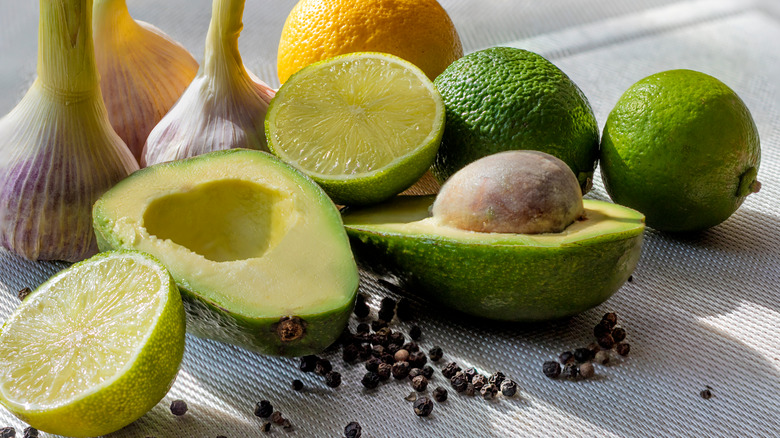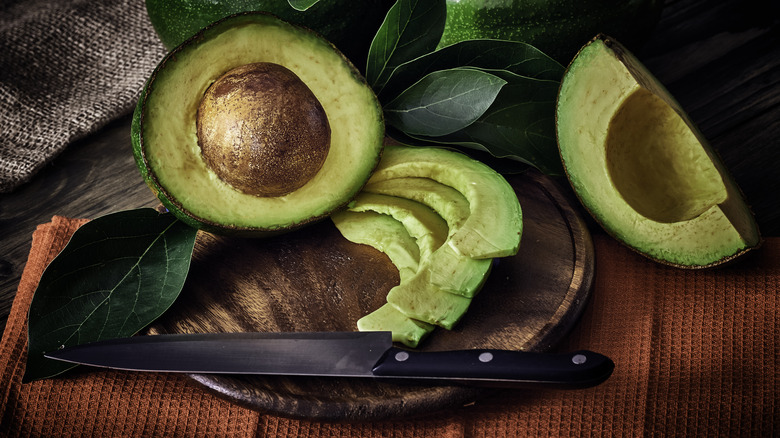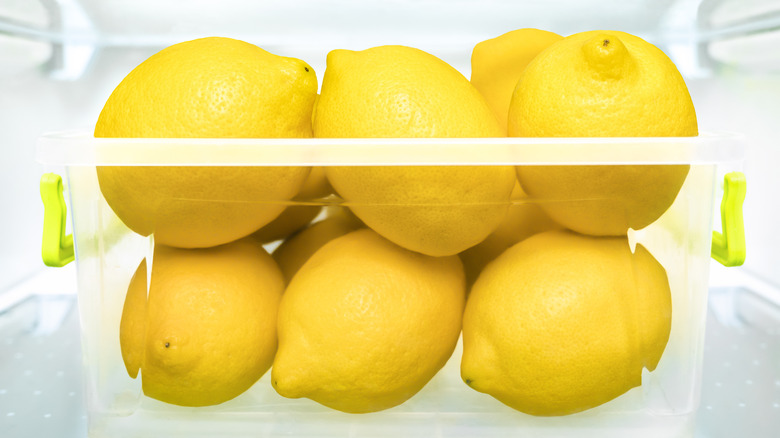Why You Should Never Store Avocados Or Citrus In Water
With its beautiful green color and buttery flesh, a perfectly ripe avocado is a wonderful ingredient for so many dishes, from brunches and salads to homemade guacamole. While there are ways you can ripen avocados faster at home, once they're ripe, they can start to turn mushy and brown pretty quickly. And even though there are ways to keep the fruit fresh for longer, you should think twice before following the viral social media hack that suggests submerging them — and also citrus fruits — in water.
It could be tempting to try this storage method that claims to keep the color and texture of avocados and citrus fresher for longer. But the hack could actually increase the likelihood of you becoming sick, thanks to a bacteria that can be found on the skins of these kinds of produce.
Pathogens such as Listeria monocytogenes and Salmonella can survive on the outside of fruits such as avocados and on some of the waxy coatings designed to increase the longevity of citrus. And if these types of produce are stored in a water bath, there's a possibility that the bacteria could actually multiply, increasing the potential risk of illness once they're cut and consumed.
Water and avocados present the risk of foodborne illnesses
The social media hack in question suggests that avocados may be stored in water for up to a month to preserve them. But an FDA spokesperson has stated that research done by the Administration demonstrated that Listeria monocytogenes could actually "infiltrate and internalize into the pulp" of the fruit within 15 days of being stored in refrigerated water (per Good Morning America).
According to FDA research published in 2018, over 17% of the 1,615 avocado skin samples they tested had Listeria monocytogenes — while Salmonella was found on the skins of 12, showing what a pervasive problem this potential contamination can be. And as noted, when stored in water — in addition to causing the bacteria to potentially multiply on the skin — there's the other big risk as the bacteria could even penetrate the skin of the avocado and enter its flesh.
It's generally good practice to wash fresh produce before peeling it, to prevent any bacteria from transferring from the knife to your fruit. But washing would not be able to remove any bacteria that may have already permeated into the flesh with this hack. So, to reduce the risk of foodborne illnesses, it's advisable to steer clear of the water storage method. The most efficient way to slow down avocado ripening and help an already ripe fruit to last longer is to store it in the refrigerator in the crisper drawer, where it should last a couple of days.
The best ways to safely store citrus at home
As with avocados, citrus fruits such as lemons, limes, and oranges should also not be stored submerged in water since the liquid is similarly prone to bacterial contamination, even if the fruit is washed beforehand. If they're going to be consumed within a week of buying them, then it's fine to keep the fruits at room temperature. Just keep them in an uncovered container, ideally with vents, and away from direct sun to keep them at their tastiest.
If you're not eating the fruits within a few days (or the weather is very hot), the best way to store them is in the fridge to help them last for up to a month. Take them out of any plastic bags, and place the fruit in the crisper. Whether they're on the counter or fridge, always keep them dry since the wet skins touching each other could encourage the growth of mold.
And consider zesting and juicing it if you want to really extend its shelf-life. Lemon zest will last in the fridge or freezer for around a week or three months respectively. You can also store fresh-squeezed lemon and lime juice in the fridge for a few days, or in the freezer in an ice cube tray for up to three or four months. But be wary of keeping it longer since homemade juice has not been pasteurized to destroy potentially harmful bacteria.



